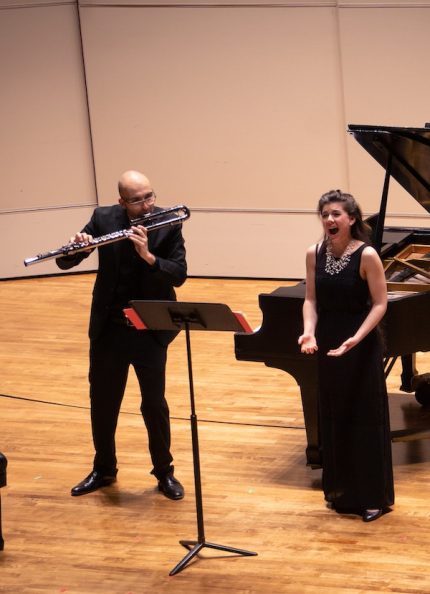A modern gem highlights Marlboro’s mixed program at Mandel Hall

A month ago, the classical music world was dealt a great blow by the death of pianist Peter Serkin. But the Serkin family legacy lives on through the Marlboro Music Festival, co-founded by Peter’s father Rudolf Serkin and grandfather Adolf Busch.
An extension of the festival is the Musicians from Marlboro program, which sends young artists on tours around the country to perform chamber works.
Five members of this program— soprano Lucy Fitz Gibbon, flutist Francesco Camuglia, violinist Robyn Bollinger, cellist Christoph Richter, and pianist Cynthia Raim—came to the Logan Center on Friday night, as part of the University of Chicago Presents series.
In keeping with Musicians from Malboro’s commitment to performing unfamiliar repertoire, the concert featured little-known works by Handel and Schubert, and a contemporary gem by Kate Soper, before concluding with a warhorse by Brahms.
Handel’s solo cantata Nel dolce dell’oblio (for Fitz Gibbon, Camuglia, and Raim) was appropriately sprightly in typically Handelian mode. But Fitz Gibbon’s singing was stiff, coming to life only in the piece’s final section, and the lack of coordination between Camuglia and Raim didn’t help matters.
Schubert’s Adagio in E-flat major, “Notturno” may have been intended as a slow movement for his Piano Trio in B-flat major. If so, he made the right call in replacing it, as it is one of his more meandering and less compelling slow movements, and the dull performance didn’t help matters.
While the louder passages had the requisite energy, all of the slower moments (except for the well-played coda) were tensionless. Schubert offers several opportunities to build suspense or to highlight a particular harmonic twist, but the musicians let these pass by.
The first half of the concert closed with a stunning performance of Kate Soper’s bravura, Only the Words Themselves Mean What They Say.
The piece is a setting of three texts by Lydia Davis (one work of flash fiction and two poems) for soprano and flute. Each text is delivered with a mixture of spoken recitation and singing, with the occasional wordless tangent. It is a veritable feast of extended techniques: the flutist has to speak, blow, and twitter into his instrument; and the soprano has to do nearly everything a voice is humanly capable of.
Were this music entirely in earnest, it would echo the worst excesses of the Cold War-era academic avant-garde. But Soper aptly describes this piece as going “from screwball comedy to paired musical gymnastics.”
Fitz Gibbon’s performance was fearless and utterly committed, both dramatically and musically, whether she was landing a high note, declaiming, growling, whooping, or beat-boxing.
Of course, timing is everything in comedy; and Fitz Gibbon’s and Camuglia’s was faultless. Throughout the piece, voice and flute are generally performing the exact rhythm. Camuglia shadowed Fitz Gibbon seamlessly, as if they were different facets of the same person. The piece ends with the performers remaining frozen for long stretches, bursting into sound, and freezing again. They were in perfect coordination here and throughout.
The concert concluded with a mostly successful interpretation of the program’s longest work: Brahms’s Piano Trio No. 1 in B major.
The excessive restraint that plagued the Schubert was gone, and here Raim, Bollinger, and Richter did justice to the dynamic sweep of the piece. Richter’s contributions were the greatest causes for joy, bringing nobility and tenderness to the cello’s statement of the opening melody and to his minor-key solo in the slow movement.
If Bollinger’s solos did not stand out quite as much, she nonetheless led passionate tuttis in the outer movements, and matched Richter well throughout, particularly in their gaunt, ghostly rendition of the scherzo’s opening.
Raim’s playing was not up to that of her younger colleagues. The veteran pianist’s articulation in the scherzo lacked their crispness, and she repeatedly came unglued from them in the inner movements.
The University of Chicago Presents continues with the Grossman Ensemble at 7:30 p.m. March 13 at the Logan Center. chicagopresents.uchicago.edu/
Posted in Performances

